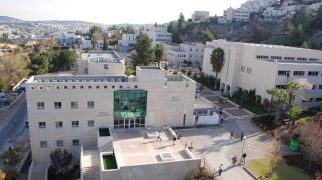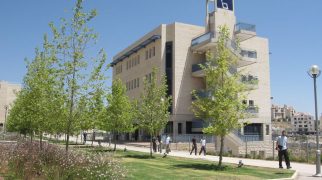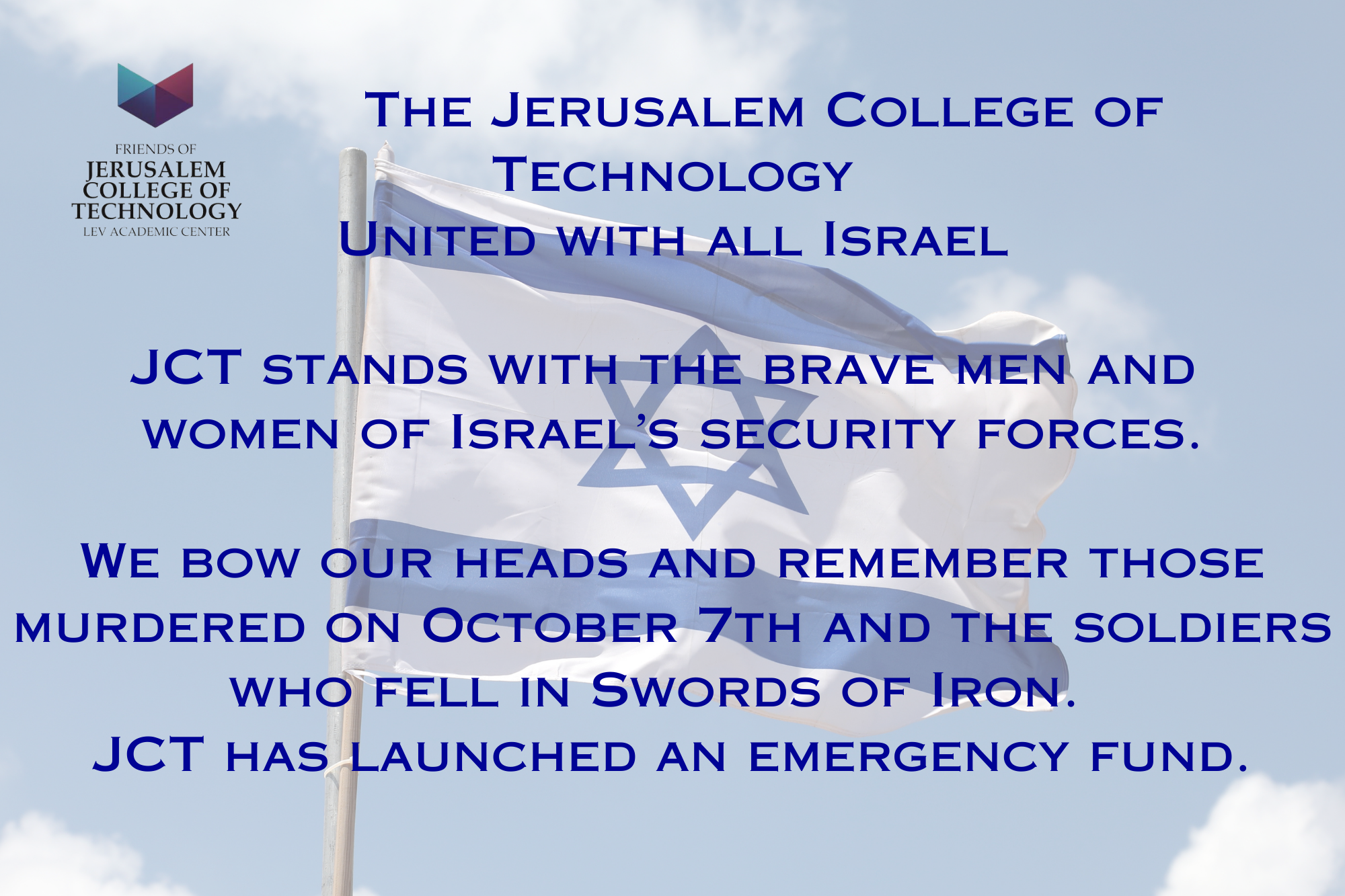March 12, 2020
The Jerusalem College of Technology Nursing Program is training an innovative new generation of caregivers.

“It’s a noble profession.” The speaker is Prof. Kenneth J. Hochberg, rector of the Jerusalem College of Technology. Hochberg, while undoubtedly proud of his school’s renowned engineering and computer tracks, is referring to one of JCT’s newest programs – its male nursing program, which opened in 2014, and which has attracted religious men throughout the country to its four-year program.
Hochberg explains that while the number of male nurses in Israel is increasing, until recently, few Jewish religious men became nurses. He finds this somewhat puzzling.
“It doesn’t make sense. The Jewish religious community excels in certain kinds of activities, like free loan societies and the like. This is a community that by its nature teaches and encourages charity and kindness and giving and helping others.” Given the fact that historically, most Jewish religious men have not become nurses, Hochberg says that the school administration had some hesitation initially as to whether it could put together a viable program.
While the first year’s class numbered just 19 students, the numbers have been rising steadily since. This year, 43 men entered the nursing program. The school is now in its sixth year and has graduated a total of 43 students from the four-year program who are now working in kupot holim, hospitals and other medical institutions throughout the country.
While the majority of the students come from national-religious backgrounds, a growing number – some 30% – are from haredi (ultra-Orthodox) backgrounds.
Moshe Meyer, 32, grew up in Jerusalem. He is married with four children and lives in Ramat Beit Shemesh. Meyer, like many of the students in the program, trained as an emergency medical technician (EMT) with Hatzalah. Meyer attended Maarava Machon Rubin High School in Matityahu. Unlike many other haredi schools, Maarava Machon Rubin offers secular studies, and allows students to study for their bagrut (matriculation certificate).
After studying in Kollel for several years, Meyer entered the nursing program in January 2016. He graduated in May 2019 with a bachelor of science degree in nursing, and received government certification in September. Today, he works as an emergency room nurse in Hadassah Medical Center in Ein Kerem. Meyer explains that among the haredi male population, there is a need for male nurses, as many ultra-Orthodox men feel uncomfortable being treated by female nurses. Nevertheless, Meyer works with all sectors of the population, and has no hesitation treating patients of all kinds.
“We treat everyone in the emergency room. We receive close to 300 patients per day, and almost 100 patients on a shift, and we treat men, women, Jews, Arabs, religious and secular, all types.”
Meyer, who has always enjoyed the medical field, says that he enjoys giving of himself to patients and families. He enjoyed the atmosphere at JCT and says that it was “like one big family.” Meyer says the school has an excellent staff of teachers, professors and doctors. Among the other components of the program he found valuable were the courses in Jewish law and medicine, which address medical questions in Jewish law such as treating patients on Shabbat, dealing with end-of-life issues and other ethical questions.
Ahuva Spitz, RN, PhD, director of the male nursing program at JCT, explains that nursing is especially vital in today’s specialized world of medicine. “Medicine is specialized, and you need a good nurse overlooking the whole picture. This is where the future is.” Spitz says that nurses need to possess a vast body of knowledge, from blood tests to medical protocols, to pharmacology.
“This our program,” she says, “and we are training the next generation for that.” Spitz notes that worldwide, approximately 20% of nurses are male. In Israel, that number was approximately 14% in 2018, up from 9% in 2005. “It is thought of as a traditionally female profession,” she says. Nevertheless, in the haredi world, people do not look down upon male nurses.
“PEOPLE WELCOMED the idea. It’s amazing how a world opened up and there’s an influx of people wanting to do this. For some, leaving the world of full-time Torah study is a barrier, but in terms of the profession, they are really heroes. It’s tied into the value of hessed [kindness] and giving, even though no one gets rich from it. It’s connected to a holy value of saving lives.”
Spitz, who taught for many years at Machon Tal, JCT’s women’s nursing program, and worked as an emergency room nurse at Hadassah for 17 years, says the nursing profession is changing. Nurses today need to be more knowledgeable. People are living longer, and chronic illnesses, multiple diseases, comorbidities and technology have all made nursing far more complicated than it once was.
The four-year curriculum at the Jerusalem College of Technology includes theoretical studies and clinical experience in various nursing fields. The theoretical studies include courses in the basic sciences, social sciences, foundations of the nursing profession and advanced courses. Students spend their first two years studying science, anatomy, physiology, pathology, internal medicine and surgery.
They then go out to the different ward units to different hospitals for hands-on clinical work while continuing once a week with pediatrics, psychology, community health and other subjects. Students also participate in a research seminars where they investigate specific medical situations, such as emergency room overcrowding, unnecessary visits to the ER, or medical staff’s adherence to flu-vaccine guidelines.
Spitz notes that the campus has a simulation lab with manikins that help the students practice their skills. The simulated heart rate and other medical conditions of the manikins can be changed. Prof. Hochberg adds that a new simulation lab is being built for the men’s campus to meet the school’s growing needs.
Practical studies take place in leading medical centers in Jerusalem and throughout Israel. Spitz says that one benefit of JCT’s nursing program is that unlike other nursing schools, which are attached to specific hospitals and get their clinical practice only in the hospital affiliated with the school, JCT students are sent throughout the country for their clinical work, and are exposed to different fields and different facilities. “They get a much richer experience than other programs,” she says.
Students in the male nursing program begin their day at Jerusalem College of Technology’s beit midrash (study hall), where they study Torah in the morning hours. Hochberg adds that students who have studied in higher institutions of Torah learning for at least three years after the age of 18 can be exempted from the morning beit midrash program. Nursing studies begin at 2:30 each afternoon, and end at 9:15 p.m.
Spitz says that many incoming haredi nursing students at JCT find the course of study to be challenging due to their limited academic experiences.
“When they finally make the step to enter the real world, they are older and have families to support and they have to sit down and study. They have a real challenge with English and math and just sitting down to study properly.”
The school offers a preparatory (mehina) program that lasts between eight months and a year for incoming haredi students, which enables them to catch up on what they are lacking in secular studies. Students in the preparatory program study math, science and English. Spitz explains that while the program is taught in Hebrew, proficiency in English is essential because English textbooks are used, and most of the medical terminology is in English.
Regardless of the language spoken, Spitz says the male nursing program places a great emphasis on the importance of proper communication. Before one class began its clinical work, Spitz recalls, she took them to Shaare Zedek Medical Center to check the heartbeats of some of the patients. The students were eager to begin, however, she reminded them that they needed to receive permission from the patients before they could start, and they then had to make sure that they spoke clearly so the patients understood what they were saying.
“It’s a real challenge, nowadays in this generation that speaks and communicates differently,” says Spitz.
HOCHBERG NOTES that the school places a special emphasis on empathy.
“We try to emphasize that nursing is caring. Your attitude, and how you approach your patient, and how you speak to a patient, and how you listen to a patient, how you dress, and you how you act in the hospital – it’s all part of the care.”
“Personal conduct is very important to us,” adds Spitz.
Roee Gorodetzer, 28, grew up in Jerusalem, volunteered with Magen David Adom, attended Mehina in Eli, and served as a medic in the IDF. Married with two children, Gorodetzer, said nursing was a good option for him.
“You are taking care of patients and are with the patients, unlike doctors who are more in front of the computer and have less time to be with the patients themselves.”
When Gorodetzer was considering nursing as a profession, some of his friends thought he should consider medical school instead, but he persisted.
“I want to do what I like to do,” he says. “I heard the argument that nursing is a place for a woman more than for a man, but I was fine with that and it didn’t bother me at all.”
Gorodetzer was attracted to JCT’s male nursing program by the combined beit midrash and nursing studies, and says that all of the students, both haredi and National-Religious, combined well and got along. He found the small size of the classes to his liking, and that his opinions mattered.
“If you answered the survey about the teachers after the semester, the things that you wrote made a difference,” he says.
He also praises JCT for their efforts in nursing research and the seminar projects, which he says, “actually improve things or bring them to a better way of thinking.” Gorodetzer’s seminar project was on the subject of overcrowding in emergency rooms, and he notes that his teacher was very supportive. Eventually, the article was printed in a medical journal.
Gorodetzer graduated in September 2019, and today works at Shaare Zedek in the hospital’s intensive care unit, working four shifts per week. Gorodetzer, who was in the school’s second class, recalls hearing that a students in the program’s first class asked if they needed to treat women as well as men.
“The minute you go in this field,” he says, “you don’t see women or men or Jews or Christians – you see people. I love cultural variety. We can learn from them as well. We learn from everyone. Sometimes you see how whole families and patients from different cultures and religions look at the treatment.”
Nevertheless, Gorodetzer is sensitive to privacy issues.
“If there is a woman you need to take care of, for example, if she is young and religious and has gynecological issues, I’ll let one of the women on the staff take care of her. If they need help, I’ll help. When you wash and bathe the patient in the morning, if you have a woman, you don’t do it by yourself, you take one of the women on the staff, for convenience and to prevent any problems.”
Roee Gorodetzer is pleased with his career choice.“You see miracles almost every day,” he says. “The things that you do actually matter for good or for bad, especially in the ICU. Whatever you do you see almost an immediate change. You are close to the families, too, in nursing, and you are treating a patient and his family.” He notes one of his teacher’s admonitions: “First of all, take care of people.”The sight of religious men wearing kippot in hospitals is not new, notes Hochberg. There have been religious doctors for many years.“But to see a religious nurse or haredi with a beard and payot [side curls] and in the hospital is not as common.”Chuckling, Hochberg reports that one haredi graduate of the program reported that when he went to the hospital, a patient mistook him for someone from Hevra Kadisha, the burial society.“There is no reason why every sector should not be represented in every profession, says Hochberg, “and that hasn’t happened in all professions yet. But this is one profession in which we are starting to change.”
See full article: https://www.jpost.com/israel-news/religious-men-take-on-male-nursing-620764




